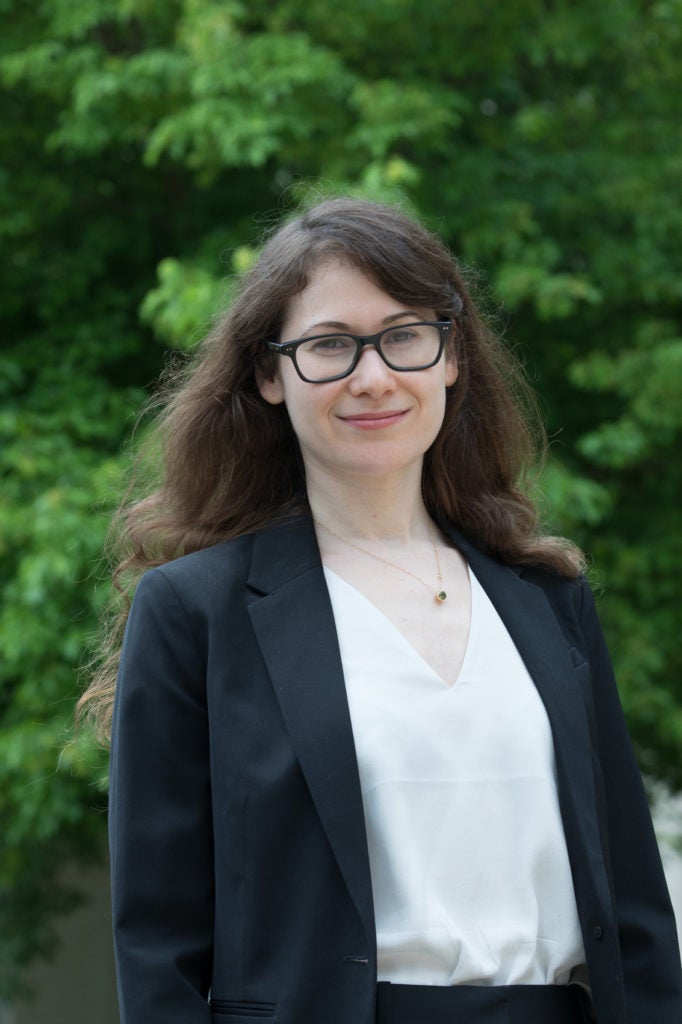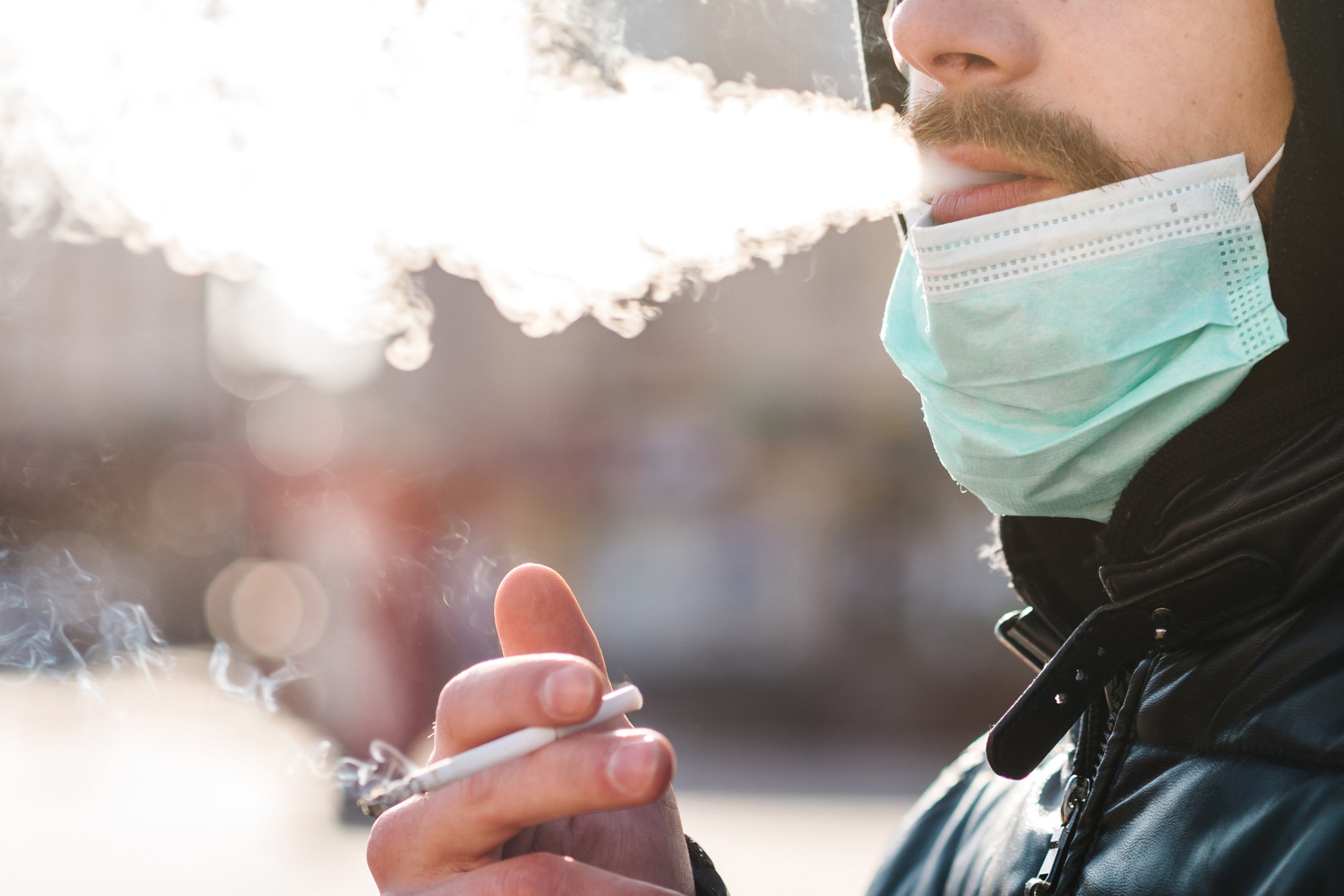Should smoking be among the pre-existing health risks that qualify people for priority access to the COVID-19 vaccine? In a Zoom interview with Harvard Law Today, public health expert Carmel Shachar J.D./M.P.H. ’10 says the answer is yes.
CDC guidelines, which most states are following as they launch mass vaccination programs, say people with certain underlying medical conditions that put them at greater risk for hospitalization or death if they contract COVID-19 (also known as co-morbidities) should receive access to the vaccine before the general population. In Massachusetts, these individuals will be eligible to receive the vaccine in Group 4 of Phase 2 of the state’s vaccination rollout plan. But many have been surprised to see smoking listed among the qualifying conditions, alongside cancer and heart disease.
Shachar, the executive director of the Petrie-Flom Center for Health Law Policy, Biotechnology, and Bioethics at Harvard Law School, says that smoking is often the result of structural and biological factors that make it more prevalent in historically marginalized communities, and that denying priority access for smokers would reinforce existing inequities. More practically, she says, “every time a person gets vaccinated, it’s good for the community.”
Harvard Law Today: How have public health experts and authorities thought about prioritizing who gets access to the vaccine?
Carmel Shachar: You can divide most of the prioritization categories into meeting one of two criteria. First, you are at increased risk for reasons of biology, which includes the presence of co-morbidities. So, you have heart disease, cancer, or a variety of ailments that mean that, if you get COVID, you are more likely to end up in the hospital or potentially dying.

Carmel Shachar J.D./M.P.H. ’10, executive director of the Petrie-Flom Center
The second focus is on the exposure you have due to the work you do or your living arrangements. So, you are an essential worker, a healthcare worker, or a teacher, and are therefore being exposed to COVID. Or you live in a long-term care facility or a nursing facility, or in Massachusetts, you are a part of the incarcerated population. These people are more likely to catch COVID because of what’s going on in their lives. But also, from a practical point, we want our healthcare workers to be able to continue working.
And these categories are important for two broader reasons. First of all, we want to minimize the number of deaths and the amount of suffering from COVID. So, it makes sense to vaccinate those who’d be most likely at risk of dying, such as people over the age of 75. Second, it also alleviates the burden on the healthcare system, which is incredibly stressed by the number of COVID patients.
HLT: Some have criticized the fact that, based on CDC guidelines, smoking is one of the pre-existing conditions that qualifies someone for priority access to the vaccine in Massachusetts and many other states. The argument is that smoking is a choice and people who’ve chosen an unhealthy lifestyle shouldn’t be prioritized over people who haven’t. How would you respond?
Shachar: On one level, choosing to smoke is a very personal choice, and we don’t want to reward people who are picking up cigarettes because it’s not good for their health. It’s not good for society to be a smoker. On the other hand, I think there needs to be an acknowledgement that there are different social pressures and factors that go into people’s choices to smoke. For example, we know that rates are different between different socioeconomic groups and different ethnic groups.
So, if we penalize smokers by saying, ‘You are at heightened risk of having a really bad outcome if you get COVID, but we think you did this to yourself,’ we’re disproportionately burdening the health of communities of color and lower socioeconomic communities. There’s an equity argument to acknowledge that not everybody grows up in a community that is supportive of avoiding smoking and avoiding the peer pressure that leads to it, and that hasn’t been targeted as aggressively by advertisements to encourage people to smoke.
HLT: What do you say to the person who leads a healthy lifestyle and wonders why smokers get priority access to the vaccine?
Shachar: On one hand, it does feel counter-intuitive to reward people for unhealthy habits, and it can feel really frustrating for people who have healthy habits and put a big effort into maintaining their health, to feel like they’re being punished by not getting the same access to the vaccine. So, I sympathize with people who might say, ‘I eat well. I run three miles a day. I don’t have co-morbidities, in part because of these health habits that I have. Why does that mean that I need to wait longer to get this vaccine?’
But there are two issues here. One is that ethically, it’s surprisingly hard to tease out personal responsibility from larger social factors in our health, both for COVID and for a whole range of other things. And then, setting aside ethics, and just from a practical standpoint, it would be a nightmare to put that extra layer of moral judgment on who is eligible when already we’re struggling to accommodate prioritization.
HLT: Public health experts have argued that many smokers took up the habit when they were in their teens. Should that factor into how we think about this?
Shachar: I think that our neuroscience colleagues around Harvard University would remind us that it seems like the brain’s frontal cortex, which controls impulse and decision-making, doesn’t fully develop until 25. And anybody who has lived with a 16-year-old would probably agree with that scientific conclusion. In law, we have this idea of ‘age of consent,’ before which you are not considered fully responsible for your actions. A lot of people start smoking during their teens. And there’s something a little bit strange about saying that, ‘because of a decision you made when you were young enough that we didn’t allow you to vote or get married without your parents’ permission, we are going to penalize you and put your health at greater risk.’
I think that also brings up the question of the biology of addiction. If my best friend and I both start smoking at 16, it may be easier for me to quit smoking when I become an adult and realize it’s a bad idea because of my internal brain chemistry. Whereas my friend, who may have more tendencies to addiction, would find it much harder to quit. There are so many factors, both social and genetic, that go into our decisions and our control that, once you start unpacking them, you very quickly lose the idea that some people have moral high ground.
HLT: You mentioned earlier that communities of color and lower socioeconomic communities have increased health risks generally. Can you say more about that?
Shachar: Our country has a long-term health debt to these communities, because these communities are often less healthy in part because of a lot of structural forces that have been enacted on them. It’s not that individuals don’t have free will, or that they don’t bear responsibility for their own actions, but their opportunities to make healthier choices are often constrained in a host of ways.
Let me give you one very small example. It’s very easy for me to get into a running routine that may address high blood pressure or heart disease. My neighborhood is very safe, and there are a lot of lovely running paths. But somebody who lived in a neighborhood that has issues with safety may really struggle to do the same. So, it’s not an even playing field. And I think incorporating the co-morbidities reflect the fact that health has not been an even playing field for centuries in our country.
HLT: How will public health officials administer this? In other words, how will they know someone has a qualifying co-morbidity, such as heart disease or, in this case, smoking?
Shachar: Every state is a little bit different and Massachusetts hasn’t yet unveiled their plan. But I think they are contemplating getting the vaccine to people with co-morbidities through their physicians. So, the physicians will look at their medical records and say, ‘Okay, I see that Jane Smith is a patient who is a smoker and has heart disease, and is therefore is at higher risk. She’s going to be part of the patients that I use my allocation of vaccinations on.’
Now, this depends on you having an existing relationship with a healthcare provider, which not everybody has. And there will also be mass vaccination sites, but whether you’ll need a doctor’s note or whether Massachusetts will let you self-identify your healthcare risks is something the state is still working out.
HLT: If states let people self-identify, does that mean someone who is desperate to get the vaccine could try to game the system or lie in order to cut in line?
Shachar: I would hope that not a lot of people would take up smoking as justification for getting a vaccine or lie about their health status in order to get a vaccine. There may be some that do, but I think we have to remember that any time a person gets vaccinated, it’s good for the community, even if it might not necessarily be somebody who we would prioritize.
HLT: As the vaccine rollout progresses, should people continue to take all the precautions — masking, social distancing — that we’ve heard about over the past year?
Shachar: Yes. Everything that Dr. Fauci says to do, you should still do, even if you’re fully vaccinated. Wear your mask, socially distance, and avoid large gatherings, particularly indoors. Especially with the new variants coming in with higher transmission rates, being as cautious as possible and not letting pandemic fatigue allow you to drop your guard is going to be really important because these variants do have a higher rate of transmission.
